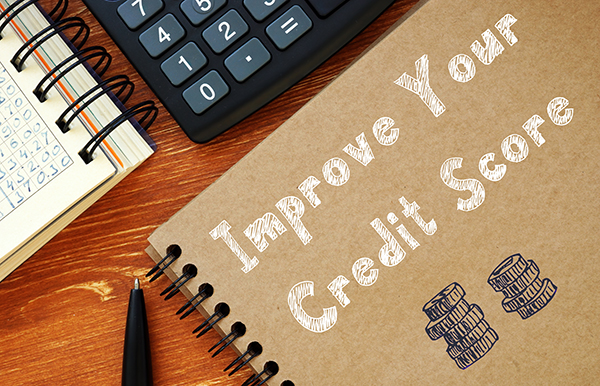Q: What are some easy things I can do to improve my credit score?
A: We get this question a lot. Here are some quick tips to help get your score moving in the right direction:
 1. Manage your credit card balances and don’t let them get too high
1. Manage your credit card balances and don’t let them get too high
The amount of credit you're using is called your credit utilization. A lot of experts will tell you to be sure you use less than 30% of your limit on any card — but truth be told, lower is better. Keeping your utilization at 10% or lower is ideal. Make sure your balance is low when the card issuer reports it to the credit bureaus, because that's what’s used to calculate your score. A simple way to do that is to pay down the balance before the billing cycle ends or to pay several times throughout the month to always keep your balance low. Making more than one payment per month also adds to your on-time payment history, so the more on-time payments you make, the greater their impact on your credit score.
Spread your purchases out among several cards, keep the balances low and pay them down on-time to multiply the effect of making several on time payments each month rather than just putting everything on a single account.
2. Request higher credit limits
When your credit limit goes up and your balance stays the same, it instantly lowers your overall credit utilization. If you’ve been managing your credit responsibly, paying on time and keeping your balances low, you have a decent shot at getting a higher limit. So ask.
3. Become an authorized user
This one can be tricky, but under the right circumstances it can be helpful. If you have a family member or close friend who has credit card accounts with high credit limits and a history of on-time payments, ask to be added as an authorized user. That adds the account to your credit reports, so its credit limit can help your utilization.
Also called "credit piggybacking," authorized user status allows you to benefit from the primary user's positive payment history — even it you never actually use the credit card to make a purchase.
4. On-time payments matter
There’s little you can do to improve your credit score if you can’t pay the bill on time. The impact can be huge as late payments can stay on your credit reports for up to 7½ years. If you miss a payment by 30 days or more, call the creditor immediately. Pay up as soon as you can and ask if they’ll stop reporting your late payment to the credit bureaus.
5. Don’t let credit report errors go unchallenged
Disputing credit report errors can help you quickly improve your credit score. You're entitled to free reports from each of the three major credit bureaus. Use AnnualCreditReport.com to request them and then check for mistakes, such as payments marked late when you paid on time, someone else's credit activity mixed with yours, or negative information that’s too old to be listed anymore.
Once you've identified them, dispute those errors.
6. Don’t ignore accounts in collection
Paying off a collections account removes the threat that you will be sued over the debt, and you may be able to persuade the collection agency to stop reporting the debt once you pay it. You can also remove collections accounts from your credit reports if they aren't accurate or are too old to be listed.
7. Get credit for rent and utility payments
Rent reporting services can add your on time rent payments to your credit reports. There are a number of them that you can subscribe to online so that when a would-be creditor looks at your reports, rent records will be there.
Experian Boost can also be useful. You link bank accounts to the free Boost service, which then scans for payments to streaming services and phone and utility bills.
8. Add to your credit mix
If you only have a credit card account, consider getting a loan. Make sure the loan reports to all three credit bureaus. If you already have loans or just a few credit cards, a new credit card may help. In addition to improving your credit mix; it can reduce your overall utilization by providing more available credit.
If you don’t have a credit card at all, consider opening an account and keeping the balance low — or even at zero. Your credit score will benefit immediately.
If you’re struggling financially, there may be times when you need to delay your monthly payments and debts. Don’t just stop paying or try to ignore them. Reach out to us online or with a phone call and have a Canopy Financial Coach help you create a plan to get back on your feet while keeping your creditors happy (and off your back). We’re here for you.
